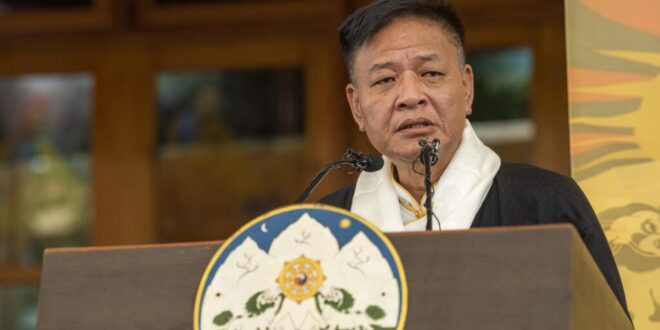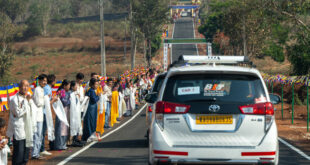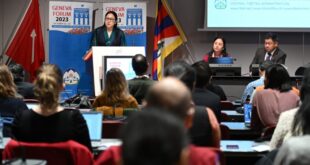Today, as we celebrate the historic occasion of the sixty-third anniversary of the Tibetan Democracy Day, on behalf of Tibetans both in and outside Tibet, the Kashag submits our deepest obeisance to His Holiness the Great Fourteenth Dalai Lama for democratizing the system of Tibetan polity. The Kashag would also like to extend our sincere greetings to the distinguished guests-the Swedish parliamentary delegates-Honourable MPs Margareta Elisabeth Cederfelt, Johanna Hornberger, Marie Charlotte Nicholson, Maria Viktoriam Stockhaus, Alexandra Anstrell, Ann-Sofie Lifvenhage, John E Weinerhall from the Moderate Party; Hon. MPs Richard Johannes Jomshof and Björn Söder from the Sweden Democrats Party; Hon. MP Gudrun Margareta Brunegard from the Christian Democrats Party; Hon. MP Janine Sofia Alm Ericson from the Green Party and Mr. Carl Mattias and Ms. Kristina Eva Maria Bjornerstedt of Swedish Tibet Committee. We would also like to extend a warm welcome to the delegates of the CTA’s Donor Conference from different parts of the world. On this occasion, we would also like to send our hearty greetings to all Tibetans, both in and outside Tibet, as well as to the supporters of Tibet and Tibetan people spread across the globe.
The Kashag’s last two statements issued on Tibetan Democracy Day briefly touched upon how His Holiness the Dalai Lama has instilled and conferred a culture of democracy among the Tibetan people over the years. These statements also provided a general overview of the development of the three pillars of democracy within the Tibetan administration. Today, we shall delve briefly into the phases of evolution of the constitutional history of Tibet.
When we look back into the history of our legal system, we had the Laws of Two Penalties and Five Approaches during the reign of Nyatri Tsenpo, the first king of Tibet; Ten Divine Virtues and 16 Codes of Conduct during Emperor Songtsen Gampo; and the Five Codes and Five Laws during the Tibetan imperial period. The period of disintegration of Tibet witnessed some deterioration in our legal system. The reign of Sakya adopted the best practices of then prevailing Mongolian laws, followed by The 15 Legal Codes during the reign of Phagmodrupa, The 16 Legal Codes during Depa Tsangpa and The 13 Legal Codes during the Gaden Phodrang. Thus, Tibet throughout its history had evolved its own national laws, religious laws and laws governing human conduct.
After coming into exile, His Holiness the Dalai Lama promulgated the Constitution in 1963 which initiated major reforms in the traditional administrative structure and introduced a system of check and balance amongst the three pillars of democratic governance. While upholding the core values of our traditional temporal and religious legal codes, such as compassion, justice, equality, non-violence, and environmental consciousness, the Constitution also safeguarded the fundamental rights and freedoms of the people. Moreover, this Constitution laid the essential groundwork for the adoption of the Charter of the Tibetans-in-Exile in 1991 by the democratically elected members of the 11th Assembly of Tibetan People’s Deputies.
From 1960 to 1990, before the adoption of the Charter of the Tibetans-in-Exile, the deputies served as members of both the Assembly of the Tibetan People’s Deputies (ATPD) as well as the Standing Commission of the National Assembly. Half-yearly and yearly work assembly meetings of both central and local civil servants as well as representatives from all settlements were convened by the ATPD to discuss and deliberate upon all issues concerning administration and public welfare. These meetings provided a platform for the representatives of people at the grassroots level to participate extensively in the decision-making process of the administration. Between 1972 to 1974, the rules and regulations governing the functioning of the Election Commission, the Public Service Commission and the Tibetan Freedom Movement were also formulated. A high-level National Committee comprising of Kalons, MPs and senior civil servants was formed to discuss and decide on important national matters. All these developments laid a robust foundation for ultimately realizing a democratic system of governance within the exile community.
A Special Tibetan People’s Meeting was convened in Dharmshala from 11 to 17 May 1990, which was attended by 369 people. Members of the Kashag, members of the ATPD, senior civil servants, representatives of various Tibetan Buddhist traditions, Tibetan NGOs, people’s representatives from various Tibetan settlements and representatives of the newly-arrived Tibetans from Tibet participated in this meeting. At this historic meeting, His Holiness the Dalai Lama dissolved the Kashag (Kalons appointed by His Holiness the Dalai Lama) and the 10th Assembly of Tibetan People’s Deputies. As authorized by His Holiness, this special meeting elected three Kalons to the interim Kashag. His Holiness urged the meeting to discuss and propose any necessary democratic reforms. Subsequently, 14 important resolutions were passed at the meeting, which paved the way for the establishment of the Tibetan Justice Commission and the expansion of the strength of the Tibetan Parliament to 10 MPs from each of the three traditional regions of Tibet, two each from the four sects of Tibetan Buddhism and native Tibetan Bon religion as well as three MPs nominated by His Holiness the Dalai Lama. Furthermore, a five-member Constitution Drafting Committee was constituted.
Assuming its role as the Constituent Assembly, members of the 11th Tibetan parliament and the constitution drafting committee discussed and deliberated upon the draft Charter on 30 May 1991. On 31st May, following the election of the officiating Speaker and Deputy Speaker, the Rules and Regulation of Parliamentary Procedure and Conduct of Business was adopted. After intensive discussions on the content of draft Charter from 3 to 13 June 1991, all the sitting MPs signed the Charter of the Tibetans-in-Exile on 14 June 1991. His Holiness the Dalai Lama assented the Charter on 28 June 1991.
Over the last 35 years, the Charter has undergone 35 amendments. Over 85% of them are related with the qualifications, election processes and responsibilities of the dignitaries of the three pillars of Tibetan polity: Kashag, Parliament and Supreme Justice Commission. About fifteen of these amendments were specifically related to the Kashag, including six which were made after 2011.
If we look at the legislative accomplishments, eleven legislations were passed within just two years of the adoption of the Charter. These include: Rules and Regulation of Parliamentary Procedure and Conduct of Business; Rules and Regulations of the Standing Committee of the Tibetan Parliament; Administrative Rules and Regulations of Central Tibetan Administration Rules; Rules and Regulations of the Public Service Commission; Exile Tibetan Rules and Regulations on Raising funds, Annual Budget and Financial Management; Rules and Regulations of Regional Tibetan Freedom Movement Committee; Rules and Regulations of Tibetan Voluntary Contribution and Other Contributions Act; Rules and Regulations of the Office of Auditor General; Rules and Regulations of the Tibetan Parliamentary Secretariat; Rules and Regulations for the Allotment of Staff Quarters and Retired Staff Quarters; and Rules and Regulations for the Presentation of Excellency Award to the Outstanding Staff of CTA.
Between 1995 to 2015, within a span of twenty years, fifteen rules and regulations were adopted, including six related with the privileges and benefits of the dignitaries. For instance, Tibetan Parliamentarian Housing Rules (1995); Tibetan Parliament Speaker’s Relief Trust Fund Rules (1997); exile Tibetan Electoral Rules (2000); the Central Council of Tibetan Medicine Act (2003); six different rules and regulations related to the salaries, allowances and privileges of Justice Commissioners, MPs, Sikyong, Kalons and the heads of the three autonomous bodies (2004); Settlement Housing and Land Use Regulations (2005); the act regulating the Council of Tibetan Religious Affairs (2009); Daily Allowance and Other Entitlements of the Members of Local Tibetan Assembly Rules (2010); rules on collecting general donation (2011); rules on officialization of the works of non-standing committee members of Tibetan parliament (2015). However, since 2015, no new legislation has been passed.
Among the rules and regulations mentioned above, the act regulating the council of Tibetan Religious Affairs, remains unimplemented, whereas certain others have gradually lost their effectiveness.
The rules and regulations of the Tibetan Public Service Commission saw the highest number of amendments (26 times), followed by the exile Tibetan Election Rules (20 times), and the Allocation of Staff Quarters and Retired Staff Quarter Rules (19 times). The parliament has already endorsed the bill put forth by the 16th Kashag, aiming to standardize workforce demarcation within the Tibetan administration and establish structured criteria and prerequisites for special appointments. Once again, the Kashag is preparing to introduce a new bill during the upcoming session of the Tibetan parliament. This proposed bill aims to introduce additional amendments to the rules and regulations of the Public Service Commission, with the goal of enhancing the overall structure of the Tibetan workforce and fostering uniformity in their privileges and benefits. Similarly, in alignment with the amended articles of the Charter, we are currently engaged in a thorough review of the regulations that oversee our electoral processes. The parliament has already granted approval to our proposed bill, which aims to enlarge the residential quarters for our entry-level civil servants. This bill also includes provisions to address any conflicting perspectives that might arise during the allocation of staff accommodations. To secure long-term sustainability of Tibetan settlements, the Kashag has initiated measures to enable the internal transfer of land and housing among Tibetans. Additionally, provisions have been established for individuals residing abroad; if they occupy their settlement residences for a minimum of one month within every two-year period, they will retain their house and land rights and will not be required to relinquish them to the administration.
In yet another advancement in our legal system, as per Article 67 of the Charter, which empowers the Tibetan Supreme Justice Commission (TSJC) to establish its own rules of procedure and codes of law, the Judiciary Code, Civil Procedure Code, and Evidence Code of the TSJC were formulated in 1996.
In accordance with the provisions outlined in the Charter, additional regulations governing the operations of our Election Commission, Public Service Commission, and the Office of the Auditor General were developed. Similarly, the Kashag has also established a series of administrative rules and regulations. These rules and regulations are continuously undergoing revision to adapt to the evolving needs of the times. Furthermore, as per Article 82 of the Charter, which empowers the Local Tibetan Assembly to create its own rules and regulations governing local activities, a total of 39 local assemblies have enacted their respective rules and regulations.
These rules and regulations have established a strong legal groundwork for the administration and its financial management, the entitlements of dignitaries and civil servants, as well as the rights and liberties of the populace. These regulations have not only bolstered the effectiveness of all aspects of our democratic governance but have also safeguarded the rights and freedoms of our people.
In the Guidelines for Future Tibet’s Polity and Basic Features of its Constitution promulgated in 1992, His Holiness the Dalai Lama has stated that “Personally, I have made up my mind that I will not play any role in the future government of Tibet, let alone seek the Dalai Lama’s traditional political position in the government.” Consequently, in 2011, His Holiness devolved all his political and administrative authority to the elected leadership.
Last year, on the Democracy Day, the Kashag appealed to constitute a charter review committee, and finally, the Parliament’s newly constituted Charter Review Committee has commenced its work. We, the Kashag, have also submitted our proposals. We earnestly hope that both the committee and the Parliament will give due consideration to the insights and opinions received extensively from the general population, including the civil servants of the CTA.
The Kashag upholds that the rule of law stands as a cornerstone in guaranteeing equality and justice, which are the embodiment of democratic values. For those of us who believe in the democratic principle of ultimate power residing in the hands of the people, a nation’s trajectory of progress depends upon the active participation of its citizens in shaping and implementing the CTA’s fundamental objectives and public policies. Even though we have made remarkable achievements over the years, our aspiration for freedom in Tibet remains unrealized. Hence, the Kashag would like to reiterate our appeal to stand united in the face of challenges.
On this occasion, we would like to take this opportunity to convey our deepest gratitude and appreciation to all the supporters for your unwavering support for the just cause of Tibet and its people. We look forward to your continued solidarity and friendship.
In conclusion, we pray for the long life of His Holiness the Great Fourteenth Dalai Lama and the perpetual flourishing of His Holiness’ endeavours and fulfilment of all His noble aspirations.
The Kashag
2 September 2023
(N.B. This is the English translation of the Tibetan original. If there are any discrepancies, please consider the Tibetan version as final and authoritative.)




